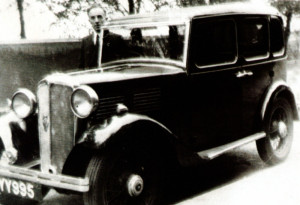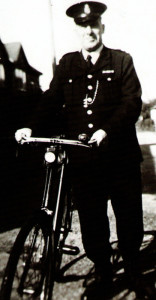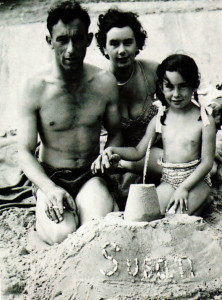
The smell of wet grass…the plaintive cries of seagulls… the gritty feel of sand between toes… the taste of fresh tomatoes… such were sensations of a holiday to a London child in the 1950s – and for my family, ‘holiday’ meant Dorset.
My grandmother, Dorothy Samways, was Dorset-born, but had married a Londoner, so each year the extended family decamped to the home of her brother and sister-in-law at West Moors. It was a small village then, bisected by the Brockenhurst-Poole stretch of main line, and if allowed to walk to the village to buy sweets I’d hang about on the footbridge hoping to be engulfed in sooty smoke and steam from a passing train (then I’d be in trouble because of smuts on my dress!).
PC Samways (alias my Great Uncle George – a huge man) was the village pol-
iceman who lived in the old red brick police house in Ashurst Road. He was good at sorting out pub brawls, and his ‘candlestick’ telephone – old-fashioned even then – fascinated me. He retired to a council house over the road and died not long afterwards.
After his death Great Auntie Vera took a job in Sutton’s, the village grocer’s. She cycled there on a heavy pre-war machine. She was very good at floristry and I loved watching her nimble fingers making wedding bouquets and funeral wreaths for villagers, using her shed as a workshop. The smell of cut flowers, particularly chrysanthemums in the late summer, still transports me back to those days.

Each day we’d go out in my grandfather’s car. He had several over the years, each ancient and battered. My grandmother and mother would make sandwiches to take out
with us, setting to work with two or three loaves after putting a cloth over auntie’s dark green chenille. While this was happening, I usually went for a walk with my grandfather. The ullage atmosphere was a great novelty to us ‘townies’. West Moors smelled sweet and fresh, the whiff of horses and cattle never far away. Strangers bade us good morning.
When everything was ready, busy Poole was our regular first stop. At that time all the traffic funnelled through the narrow high street, and more often than not we’d have to wait at the busy level crossing. Sometimes my grandmother would buy lardy cake and Miller’s pork pies in Poole to supplement the sandwiches. At the beginning of each holiday I was always bought a bucket and spade and equipped with canvas beach shoes.
Then it was off to Hamworthy, a backwater of Poole Harbour. We discovered Hamworthy in 1950. It had a nice little sandy beach, and we had to share it only with gulls and the occasional fisherman on the jetty. We ate our picnic sitting on rugs on the sand, and when the adults agreed I’d had enough time to digest my food I was allowed in the sea. This was the best single thing of the holiday. I had several swimming costumes, which my mother knitted in a variety of colours. You still needed coupons for clothes, and anyway my young parents had little money. The wool made the swimsuits go baggy when wet.

If the weather was poor we ate our food in the car. My grandmother, a lifelong optimist, would peer across the harbour through the rain and remark from time to time: “The sun’s shining at Wareham. I think it’s moving this way.” My grandfather would brew wonderful thick, strong, sweet tea on his primus stove. He had an elaborate arrangement to shelter it from the wind behind the car.
During our fortnight we also made a special journey to Frampton, my grandmother’s tiny home village. First there was an hour or two in Dorchester (where I once got upset because some men were prodding a reluctant pig with a stick in the cattle market), then we’d picnic by the river at Frampton, where I saw my First kingfisher, a flash of darting turquoise over the clear trout-filled Frome.
My great grandparents, great-great grandparents, a great aunt and several cousins lie in the quiet country churchyard of St. Mary the Virgin, Frampton, and it meant a lot to my grandmother to tidy their graves and place flowers there. We always went into church, too. Signing the visitors’ book was fun, and you can still see my seven-year-old signature there, dated 1954. My grandparents were married and my father baptised in Frampton Parish Church, so it was a very special place. They inculcated a strong and lasting sense of this into me at an impressionable age.
Susan Elkin








